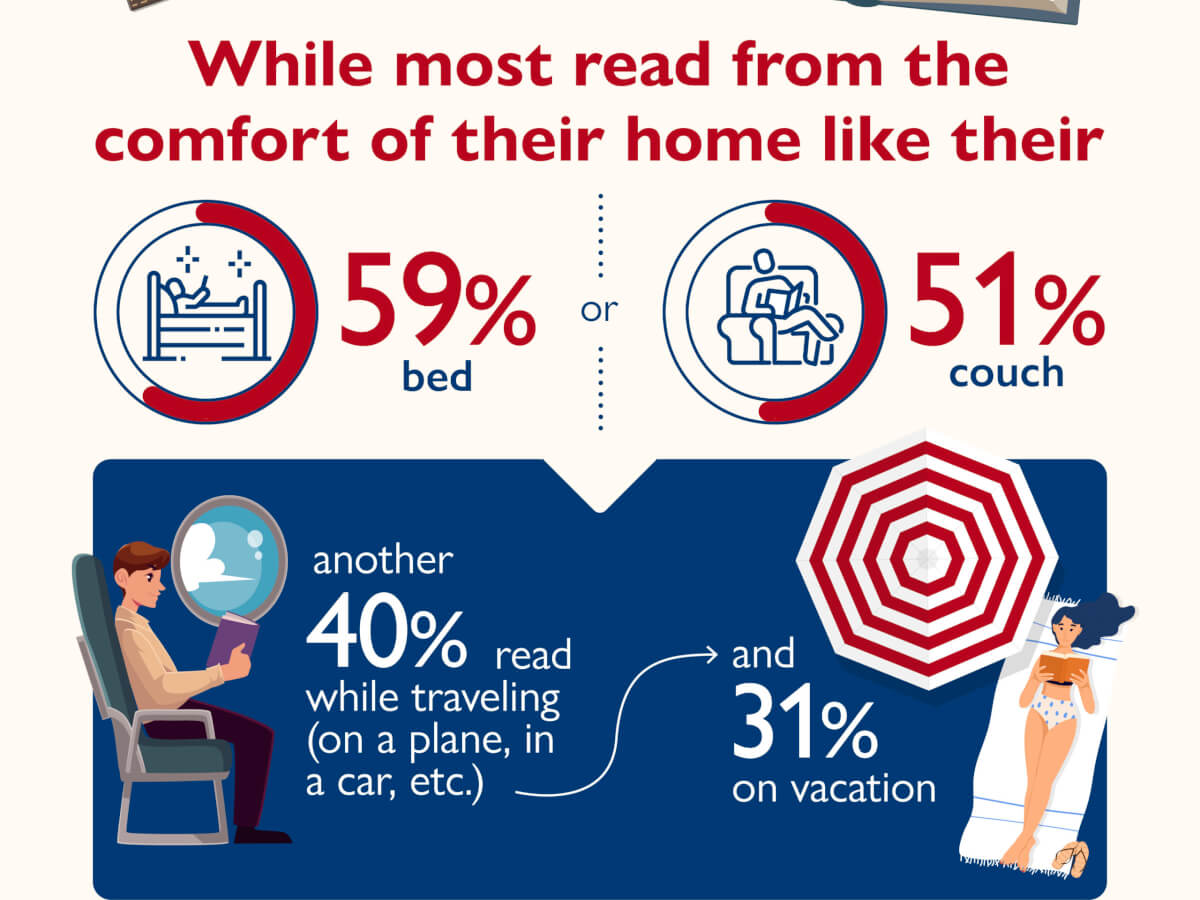NEW YORK — People who like to read action/adventure books are the most generous tippers, according to a new poll. The survey of 2,000 Americans who read frequently looked at the personality differences between lovers of different genres and finds that adventure readers are the most likely to tip over 20 percent.
Unsurprisingly, romance readers “always” or “often” daydream the most (37%), but are also the most likely to say they worry often (52%). Those who enjoy reading biographies, on the other hand, are the least likely to have worries regularly (49%).
Of all of the genres, fiction (37%), mystery or crime (35%), and romance (26%) are some of the most well-loved books.
On average, respondents spend 10 hours a week reading — although 45 percent admit they have their head in a book for longer than this. Those who prefer historical fiction or thriller books are the most likely to spend the most time reading.
Conducted by OnePoll for Apple Vacations, the survey finds that while most read from the comfort of their home, in places like their bed (59%) or couch (51%), another 40 percent read while traveling and on vacation (31%).
Seven in 10 book lovers say they’re fascinated by stories because they’re a daily vacation away from life. Forty-seven percent say books are just as effective as vacations to “escape from real life for a while.”

Respondents love their books so much that 71 percent make reading a priority compared to other chores. Three in four carve out time for reading at home (78%) and 66 percent also make time for reading while on vacation. Those who enjoy romance books (82%) and adventure books (79%) especially prioritize time for reading on vacation.
They’re not the only ones: half of all book lovers say that books are an “essential” to bring while traveling (51%). What makes the best vacation read? Respondents say mystery or crime books (38%), fiction (25%), or thriller books (25%).
Other criteria for the perfect vacation book are taking place at a similar location as the trip (45%), being a classic or old favorite (43%), or being outside of your comfort zone (31%). According to respondents, the best places to read on vacation are by calming waters like the pool (38%) or the beach (32%).
“Whether they’re downloading a new novel to their tablet or throwing a few paperbacks into their beach bag, reading continues to remain a popular travel pastime. Even when you’re not able to get away, books can help provide an escape or inspire a new adventure!” says spokesperson Dana Studebaker, vice president of marketing, consumer brands at Apple Leisure Group, in a statement.

More than a third of those surveyed have also been inspired to travel somewhere because of a book (38%) and 77 percent of these respondents have followed through on these travels to places like Wordsworth’s home, the Great Wall of China and Peru. A majority of those who have found travel inspiration in books are currently planning that trip (71%) to destinations like South Africa, Costa Rica and New York.
Vacation spots vary by what book you enjoy, too. Romance readers enjoy family-friendly vacation spots the most (51%), while tropical getaways are favored alike by respondents who read fiction (39%) and non-fiction books (38%).
Interestingly, horror lovers are the only group to have a preference for small towns (44%).
“There are so many beautiful places in this world and sometimes that can make it hard to decide on where to plan a vacation. Reading about the many adventures of the characters in books often inspires me to get out and create my own exciting experience whether it means talking to a stranger in a coffee shop or planning the trip of a lifetime,” says spokesperson Mike Lowery, head of global consumer business at Apple Leisure Group Vacations.
Survey methodology:
This random double-opt-in survey of 2,000 Americans who read regularly was commissioned by Apple Vacations between Dec. 1 and Dec. 4, 2023. It was conducted by market research company OnePoll, whose team members are members of the Market Research Society and have corporate membership to the American Association for Public Opinion Research (AAPOR) and the European Society for Opinion and Marketing Research (ESOMAR).



